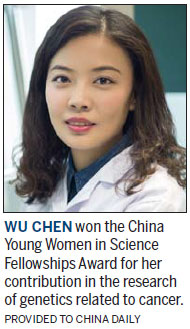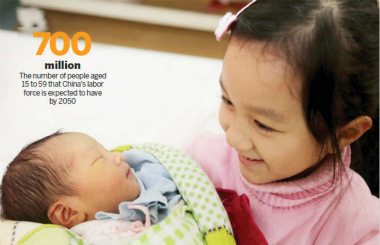Genetic link to cancer a breakthrough
Updated: 2016-01-22 08:40
By Liu Zhihua(China Daily Europe)
|
|||||||||||
At 33, Wu Chen is the youngest recipient of award honoring women
Wu Chen has spent years studying how cancer may be linked to genes.
And now, her research on genetic mechanisms of cancer is being recognized by the country's scientific community.
In December, Wu, 33, became the youngest recipient of the China Young Women in Science Fellowships Award, an annual honor jointly sponsored by government agencies - the All-China Women's Federation, the China Association for Science and Technology, and the Chinese National Commission for UNESCO - and the Chinese arm of French cosmetics company L'Oreal.
The award, which was also given to eight others, seeks to highlight the contributions made to society by the country's young women scientists.
Wu is a researcher with Cancer Hospital of the Chinese Academy of Medical Sciences, where she earned a doctorate in oncology in 2011.
Her studies mostly center on genetics that make people susceptible to the risks of cancer.
Esophageal cancer is her area of specialization. The cancer related to the esophagus is among the deadliest cancers in China, with half of the world's 300,000 deaths caused by it being reported from the country every year, Wu says.
The National Central Cancer Registry says that the incidence rate of esophageal cancer is 21.62 people per 100,000 nationwide, and the death rate is more than 16 people using the same base figure.

Shen Yan, academic director with the award's panel of judges and vice-president of the National Natural Science Foundation of China, says Wu was unanimously selected for the award owing to her significant research on genetics related to cancer.
By comparing genetic samples of more than 20,000 patients of esophageal cancer with those without cancer, Wu and her team found 14 gene fragments that increase the risks of this particular type of cancer.
When researchers understand more about the mechanisms involving cancer and genes, they will know how to lower the risks of cancer, Wu says.
Wu spent two years as a postdoctoral fellow at Harvard University, before joining Cancer Hospital in 2013.
Widely considered the best Chinese institute for cancer research and treatment, the hospital has been studying esophageal cancer since the 1960s, especially after scientists found the cancer's incidence rate to be significantly higher in areas south of the Taihang Mountains along the borders of Henan, Shanxi and Hebei provinces than in the rest of the country.
Over the past two decades, the hospital's researchers have delved into etiology, the branch of medicine that studies causes and origins of diseases, and traced environmental factors that cause esophageal cancer. The hospital also enhanced its study of cancer genetics from 2000 due to progress in technology, Wu says.
Developing a bank with genetic samples of more than 20,000 cases is a big achievement of the hospital, she adds.
While strongly committed to research, Wu says she believes women in science are just like those in any other field and should not be treated differently - either through discrimination or praise.
The stereotypical image of a female scientist is someone in a white lab coat with little care for her appearance.
Although Wu wears little makeup, she says it is up to a woman to decide how she wants to look. Besides, "a woman's confidence is her best makeup", she adds.
liuzhihua@chinadaily.com.cn
(China Daily European Weekly 01/22/2016 page19)
Today's Top News
Global push
AIIB chief vows to run clean, lean, green institution
'More Europe' to deal with 'triple crisis'
China gives beleaguered Tsipras a helping hand
China injects note of confidence in Davos
China and Gulf nations resume free trade talks
IMF starts to select new chief
Merkel insists on European solution for refugee crisis
Hot Topics
Lunar probe , China growth forecasts, Emission rules get tougher, China seen through 'colored lens', International board,
Editor's Picks

|

|

|

|

|

|






